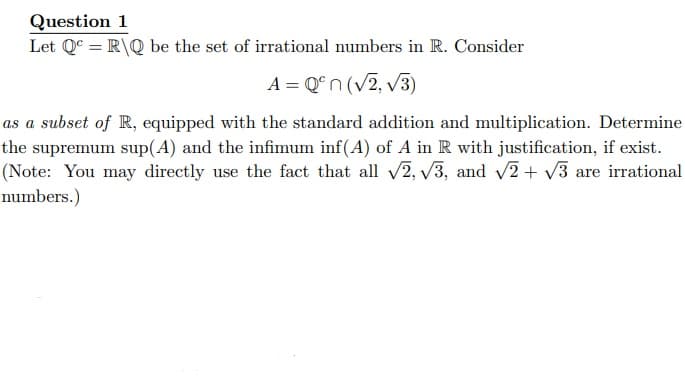Question 1 Let Qe R\Q be the set of irrational numbers in R. Consider A = Qºn (√2, √3) as a subset of R, equipped with the standard addition and multiplication. Determine he supremum sup(A) and the infimum inf(A) of A in R with justification, if exist. Note: You may directly use the fact that all √2, √3, and √2+√3 are irrational numbers.)
Question 1 Let Qe R\Q be the set of irrational numbers in R. Consider A = Qºn (√2, √3) as a subset of R, equipped with the standard addition and multiplication. Determine he supremum sup(A) and the infimum inf(A) of A in R with justification, if exist. Note: You may directly use the fact that all √2, √3, and √2+√3 are irrational numbers.)
Elements Of Modern Algebra
8th Edition
ISBN:9781285463230
Author:Gilbert, Linda, Jimmie
Publisher:Gilbert, Linda, Jimmie
Chapter6: More On Rings
Section6.3: The Characteristic Of A Ring
Problem 13E
Related questions
Question

Transcribed Image Text:Question 1
Let Qc = R\Q be the set of irrational numbers in R. Consider
A = Qºn (√2, √3)
as a subset of R, equipped with the standard addition and multiplication. Determine
the supremum sup(A) and the infimum inf(A) of A in R with justification, if exist.
(Note: You may directly use the fact that all √2, √3, and √2 + √√3 are irrational
numbers.)
Expert Solution
This question has been solved!
Explore an expertly crafted, step-by-step solution for a thorough understanding of key concepts.
Step by step
Solved in 2 steps with 1 images

Recommended textbooks for you

Elements Of Modern Algebra
Algebra
ISBN:
9781285463230
Author:
Gilbert, Linda, Jimmie
Publisher:
Cengage Learning,

Elements Of Modern Algebra
Algebra
ISBN:
9781285463230
Author:
Gilbert, Linda, Jimmie
Publisher:
Cengage Learning,